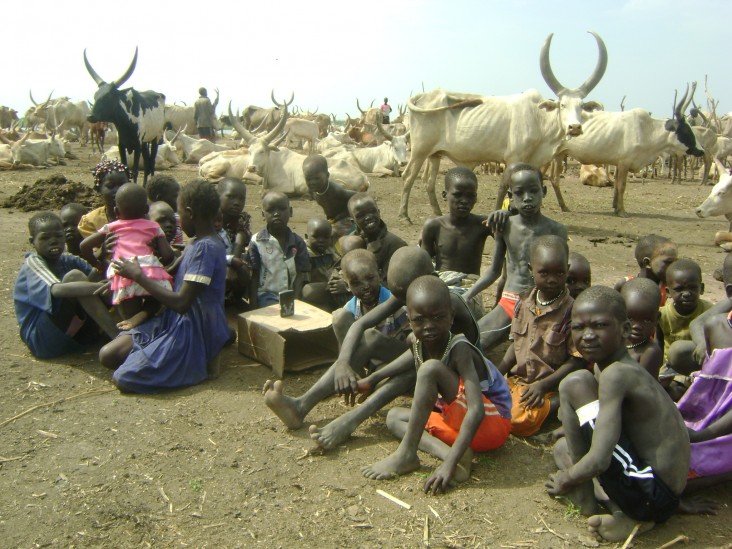
Feb. 2015—Since the conflict began in South Sudan in December 2013, nearly 1,200 schools in the most conflict-affected states have closed. An additional 400,000 children and adolescents have dropped out due to the crisis, and some 90 schools are occupied by fighting forces or internally displaced persons.
When the conflict erupted, some families in the Jonglei state capital of Bor were displaced from their cattle camp, Matok, to an island on the River Nile where they temporarily settled with their cattle. Although fighting drove them from their camp, the children of Matok have been able to continue learning with a simple and mobile USAID literacy program called All Children Reading.
Teachers and elders of the cattle camp are keen that their children learn to read in their mother tongue before they learn other languages. Before the conflict began, the children were introduced to reading in their mother tongue, Dinka Cham, using digital audio players provided by ACROSS, a South Sudanese NGO that implements the literacy program. Teaching materials also included an alphabet chart, alphabet book and story book.
Cattle camps such as Matok have limited access to school, and parents are reluctant to send their children to schools far from the camp. Children spend most of the day playing since their activities are limited to tending cattle, including protecting calves, milking cows and looking for water points. When the All Children Reading program was introduced to Matok, all the children and parents were excited about the opportunity.
A committed Matok mother-tongue teacher, Riak Kuol, brought the program’s teaching materials to the island when the community relocated. He also bought a blackboard and chalk to help the children learn. In eight months, the children had already mastered the materials.
When ACROSS staff member John Chol visited them in May 2014, the children welcomed him with songs they had learned from the lessons. ACROSS conducted a simple survey that indicated the children could read their mother-tongue alphabet, short words and simple sentences.
Community elders of the Matok cattle camp commend the positive change in their children. “Our children were very idle,” said Deng Bior, the camp’s chief. “After releasing all the animals for grazing, all the children would be playing the whole day. But when you introduced the learning of mother tongue, they have now changed their style of playing. They now concentrate on learning to read.”
USAID launched the All Children Reading program in 2011 as part of a Grand Challenge for Development to improve literacy rates among children in developing countries. In South Sudan, the program has focused on teaching mother-tongue literacy in lower primary grades as a practical approach for improving literacy, including in cattle camps, where illiteracy rates are high. With the aid of digital audio players, the program has benefitted 150 schools and 50 community education centers in Central Equatoria state and 100 schools and 50 nomadic cattle-keeping communities in Jonglei and Lakes states.
LINKS
Follow @USAIDSouthSudan, on Facebook, on Flickr







Comment
Make a general inquiry or suggest an improvement.